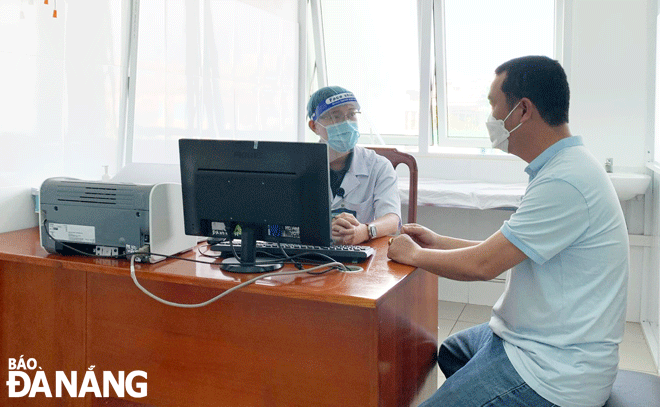Da Nang focuses on care for people with post-COVID conditions
Many Vietnamese people who have recovered from COVID-19 but have still suffered from post-COVID-19 symptoms have to seek support from hospitals. They are highly recommended to be persistent with the post-COVID care and maintain peace of mind.
 |
| A patient come to the Post-COVID-19 Treatment and Counseling Clinic of the Da Nang General Hospital to ask for advice on symptoms reported after being cured of COVID-19. Photo: PHAN CHUNG |
Many post-COVID-19 symptoms reported
Such symptoms that may last for months after the infection has gone are called post-COVID-19 conditions or ‘long COVID’ syndromes, according to the World Health Organization (WHO).
COVID-19 patients recover after 2 to 6 weeks, and while most of them return to normal health, some can have symptoms that go on for weeks or even months after their recovery from the respiratory disease.
Post-COVID-19 conditions occur in individuals with a history of probable or confirmed SARS CoV-2 infection, usually three months from the onset of COVID-19 with symptoms.
After more than 3 weeks of operation, the Post-COVID-19 Treatment and Counseling Clinic of the Da Nang General Hospital has received hundreds of patients for examination, psychological consultation and treatment of sequelae.
Having recovered from COVID-19, a 43-year- old male resident of Thanh Khe District came to this clinic for the handling of a series of symptoms.
“At the end of 2021, I contracted COVID-19 and recovered a week later. The process of contracting and receiving treatment of this highly contagious disease, I felt normal and healthy. But after going home for a week, my body began to feel tired, along with muscle fatigue, insomnia and lack of appetite”, said the man.
Similarly, after being cured of COVID-19, another patient dwelling in Son Tra District experienced a worrisome weight loss caused by digestive disorders, loss of appetite, stomach pain and prolong diarrhea. Too worried about her health, the woman fell into a state of insomnia and depression.
According to Doctor Nguyen Hua Quang, Head of the Department of Respiratory Internal Medicine, Immunology – Allergy of the Da Nang General Hospital, who is the manager of this clinic, on average, every day, the clinic receives 20-30 patients for examination, treatment and consultation on serious post-COVID-19 complications.
A range of new, recurrent or ongoing health problems that people may face after their recovery from COVID-19 such as shortness of breath or feeling short of breath, fatigue or dizziness, persistent cough, chest and muscle pain, loss of taste and smell and headache.
“The most common problem is related to the lungs. Patients with severe COVID-19 complications may suffer from pulmonary fibrosis, which reduces respiratory function. In milder cases, shortness of breath and chest tightness usually occur. The heavily-affected breathing also hinders the operation of the nervous system, which may lead to a series of mental-related syndromes”, doctor Quang.
He added that doctors have to use psychotherapy to reassure patients who fall into depression and anxiety during their post-COVID-19 period.
In reality, in order to successfully treat post-COVID-19 symptoms, in addition to the support and intervention conducted by doctors, the patient's patience is essential, because there are symptoms that last up to 18 months before they can be cured.
Psychological stability: a must-do
According to Doctor Nguyen Thanh Trung, Deputy Director of the Da Nang General Hospital, the most important thing for those who suffer from post-COVID-19 complications is to stabilize the mind, avoid panicking and worrying too much, and also importantly, to be proactive and self-aware with exercises and instructions delivered by doctors.
First of all, people who have recovered from COVID-19 need to take a number of measures such as maintaining a reasonable sleep time, mainly sleeping a lot at night, health rehabilitation activities such as light physical exercise.
Attention should be paid to gradually exhaling slowly and gently without haste, with the pace increasing day by day.
For the elderly, talking with family members and being encouraged and supported by relatives will help them reduce anxiety and stimulate brain activity after recovering from the disease.
They are also highly recommended to actively participate in mental activities such as reading books/newspapers, reduce stress and positively think.
The majority of post-COVID-19 syndromes are mild and they will pass, without much medication. Patients should be proactive in taking care of themselves. For example, if the cough persists, they should consume salted lemon, handle their aches and pains by themselves with the application of medicated oil, conduct steam inhalation if they feel chills and inhale the garlic aroma to overcome olfactory and taste disturbances.
Reporting by PHAN CHUNG – Translating by A.THU